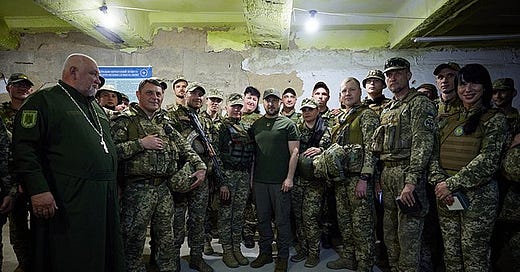A year ago I had just finished giving a talk about Bethel history when I checked my phone to discover a different kind of history unfolding. I learned on Twitter what millions of Ukrainians were learning firsthand: Russian infantry and armored units invading from multiple directions; Russian missiles targeting sites around the country. That weekend I found myself taking questions from a local TV news anchor about something I didn’t expect to see again in my lifetime: a war in Europe.
At that point, I expected Vladimir Putin’s “special military operation” to resolve successfully, however brutally, within weeks, if not days. It’s not the result I hoped for, but it seemed inevitable given the relative strength of forces. I didn’t expect Russians to fight as ineptly as they did, nor Ukrainians to resist as fiercely as they did. I didn’t expect a former comedian to be as compelling a wartime leader as Volodymyr Zelenskyy proved to be. And I didn’t expect Joe Biden and European leaders to respond as effectively as they did, managing to maintain a united front that at once supported Ukraine, reinvigorated NATO, and avoided direct conflict with Russia itself.1
So here we are, beginning year two of this bloodier expansion of a war that began when Russia annexed Crimea in 2014 and continued beyond the world’s notice in the borderlands between Ukraine and its larger neighbor. I’m marking the occasion in two ways:
First, my review of Cathal Nolan’s remarkable new book, Mercy: Humanity in War, went up today at Current.2 While I drew chiefly on Nolan’s analysis of conflicts involving the United States, including the two world wars and more recent conflicts in Iraq and Afghanistan, the review starts with Alexei Chaban, a Ukrainian farmer-reservist called to active duty in January 2015. After sparing a Russian officer’s life in the Donbas, Chaban became famous for sharing an open letter to his foe’s mother, wishing that her son would “live peacefully and not take sins on his soul.”
Second, this Sunday morning I’ll conclude my two-part adult forum on Ukraine at Trinity Lutheran Church in Stillwater, Minnesota. I’m still tinkering with my notes, but let me preview at least some of how I think the war in Ukraine can help Christians think more clearly about war, peace, and justice.
Keep reading with a 7-day free trial
Subscribe to The Pietist Schoolman to keep reading this post and get 7 days of free access to the full post archives.




